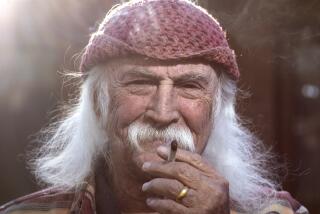Johnny Bragg, 79; Lead Singer of the Prisonaires
- Share via
Johnny Bragg, lead singer for the Prisonaires, a black vocal group he formed while in the Tennessee State Penitentiary in the 1950s, died Wednesday in Nashville of cancer, his daughter told the Associated Press. He was 79.
At the time, Tennessee Gov. Frank Clement touted the Prisonaires as part of his prison reform effort, citing the group as an example of rehabilitation. The Prisonaires routinely performed for dignitaries and celebrities, including President Harry S. Truman.
The group’s members changed often as singers moved through the penal system, but Bragg, who served time on various charges, including rape and shoplifting, was a mainstay.
In 1953, with a guard and trustee driver, the Prisonaires traveled to Memphis to record the melancholy ballad “Just Walkin’ in the Rain” for Sam Phillips’ Sun Records. The recording, which sold more than 50,000 copies, featured Bragg as lead tenor singing lyrics that a prison inmate could easily understand: “People come to windows, they always stare at me. Shake their heads in sorrow, saying: Who can that fool be?” The familiar reprise is: “Just walkin’ in the rain, thinking how we met. Knowing things could change, somehow I can’t forget.”
“That is one of the most beautiful songs ever written,” Phillips once said of the song by Bragg and Robert S. Riley.
Peter Guralnick, writing in “Last Train to Memphis: The Rise of Elvis Presley,” said that the Prisonaires’ “Just Walkin’ in the Rain” “put Sun Records on the map” and was “very likely the item that captured the attention of Elvis Presley,” who later went to Sun to record his first songs.
In 1956, a much more upbeat version of “Just Walkin’ in the Rain” became a million-seller for a white singer, Johnnie Ray.
After breaking from Sun Records in 1954, Bragg renamed his group the Marigolds and recorded Riley’s “Rollin’ Stone” for the local Excello label. The Latin-flavored tune landed in the Top 10 of Billboard’s R&B; chart, giving Excello its first significant hit.
Clement pardoned Bragg in 1959, but the singer landed back in prison. In 1961, after Presley was discharged from the Army, he visited Bragg and offered to pay his legal bills, but Bragg declined. He was in and out of prison for many years afterward.
In an interview recounted in a 1999 article about the Prisonaires by John Dougan in American Music, Bragg said that the group was his fondest career memory.
“I’m very proud of them, and I miss that. They’re all gone now. That’s something you can’t forget,” he said.
More to Read
The biggest entertainment stories
Get our big stories about Hollywood, film, television, music, arts, culture and more right in your inbox as soon as they publish.
You may occasionally receive promotional content from the Los Angeles Times.









